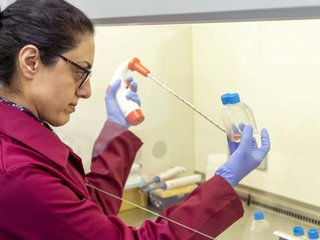My priorities as chief executive of Blood Cancer UK
Helen Rowntree, who was previously our director of Research, Services and Engagement, has been appointed Blood Cancer UK’s chief executive. Helen shares her thoughts on her new role.

Helen Rowntree, the new Chief Executive of Blood Cancer UK
I know from previous experience that when you get a new job, lots of people get in touch to say well done and good luck.
But when your new job is as a chief executive, I’ve learned, the congratulations and good wishes are often followed by a question:
What are you going to change?
It’s a reasonable question. Often, shifting organisational strategy or changing the structure is the best way for a new chief executive to have maximum positive impact. And, let’s be honest, there’s also the human side of it. We all want to feel like we’re making a difference in our jobs, and the easiest way is often to make something different.
But when people ask me what I’m going to change now I’m chief executive of Blood Cancer UK, here’s my answer: We're going to carry on heading in the same direction. But the direction we’re already heading in will require us to significantly change how we work.
But how can these apparently contradictory things both be true?
Firstly, we’re going to keep going as we were because I’m confident we’ve already got the right strategy. We only finished it last year, so the ink on it is barely dry. But much more importantly is how it was developed.
It’s not a strategy that reflects the priorities of our previous chief executive, Gemma Peters, any more than it reflects mine. Our strategy was developed in a way that ensured it was shaped by our whole community, and this means it’s still the right strategy, whoever happens to be at the helm.
But the fact that our strategy is staying the same doesn’t mean we can stay the same, too. In fact, people affected by blood cancer have told us they are ambitious for us to have much more impact. So we’ve set the ambition to double our income, dramatically increase the amount we spend on research, and see a big rise in the proportion of people affected by blood cancer who we’re in contact with.
It would be impossible to deliver this step change in impact unless we change how we work.
You can find more detail about this change in the strategy itself, but I thought it would be worth setting out three things that we’re going to be focusing on over the next couple of years.
1. We’re going to do more to raise awareness of blood cancer
As we blogged recently, people affected by blood cancer are being held back by the low awareness of the condition. This lack of awareness means many people are missing out on important entitlements, and that there isn’t as enough political focus on improving blood cancer.
So you’ll notice that more of our work will focus on getting across the message that blood cancer is the UK’s fifth most common type of cancer, and that leukaemia, lymphoma, myeloma, and all the other types of blood cancer are types of blood cancer rather than just individual conditions.
But we won’t have the big marketing budget to do this on our own, and so a big focus will be empowering our community to spread the message.
2. We’re going to do more to reach people who we have failed to reach previously
Over the last couple of years, we’ve increased our focus on become more inclusive as an organisation and ensuring our work is benefitting a more diverse group of people.
But we’re yet not doing well enough in this area. The stark fact is that if you are affected by blood cancer and are from an ethnic minority group, you’re less likely to be in contact with us than if you’re from a white British background. This means we’re currently falling short in our ambition to support everyone affected by the condition regardless of background.
So as we start work in the next few months on developing new ways of supporting people with blood cancer, we will make sure that, in particular, people from ethnic minority communities are key to shaping those services. This will be one of the key ways we’ll redress the balance.
Because we never deliver on our mission unless we are there for everyone affected by blood cancer.
3. We’re going to do more to put people affected by blood cancer in control of our work
I’m proud of how we already do lots to involve people affected by blood cancer in our decision-making – how we developed our strategy is a good example of this. But we need to go further.
This is because it’s the right thing to do: every pound we spend is to benefit our community, so our community should guide how we spend it. But it will also make us much more effective.
So with every new thing we do, from our support and information to how we raise money or decide what research we fund, we will be transparent about how people affected by blood cancer were involved in the development of that work.
In fact, if there’s a single thing that I’d like my time as chief executive to be remembered for, it’s as the time we achieved amazing things by doing than ever before to unleash the amazing passion, creativity, and knowledge within our community.
Because if our history teaches us anything, it’s that a community of dedicated people can change the world.

Because research will beat blood cancer
Over 60 years, we've invested more than £500 million in blood cancer research which has led to a long line of breakthroughs that have improved treatments and saved lives.
